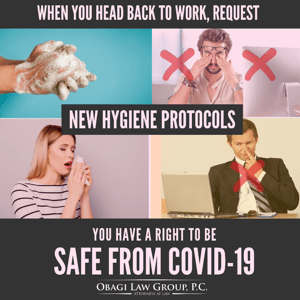What rights does an employee in California have when returning to work after COVID-19?
At some point in the near future, employees are going to return to work after this COVID-19 pandemic and, you called it – the coronavirus is still going to be around. Especially as long as a vaccine has not yet been developed, employees in California should be aware of their rights to workplace safety after the coronavirus pandemic. While the onus is often on employees to tell their employer what to do, California employee are protected when they express concerns about workplace safety.
Employees have the right to a safe working environment. And perhaps at no time in history will that right be more critical than when employees return to work as states and localities lift their safer-at-home orders.
There are a plethora of guidelines, protections and avenues of recourse in place to ensure a safe working environment for employees. To that end, here are some tools workers in California can employ to make sure their workplace is safe – and can take advantage of should their employer not provide a safe workplace.
Cal/OSHA guidelines
 Even if your employer is not a hospital or industrial plant, every employer must abide by Cal/OSHA’s “Interim Guidelines for General Industry on 2019 Novel Coronavirus Disease.” These guidelines require employers to:
Even if your employer is not a hospital or industrial plant, every employer must abide by Cal/OSHA’s “Interim Guidelines for General Industry on 2019 Novel Coronavirus Disease.” These guidelines require employers to:
- Encourage sick employees stay home altogether.
- Send home any employee showing symptoms of acute respiratory illness (i.e., tough time breathing).
- Implement proper workplace safety etiquette requirements, and disseminate that information to the entire workforce through written materials or training. For example, an employer should:
- Provide employees with information on proper cough and sneeze etiquette
- Provide employees with information on proper hand hygiene
- Instruct employees to avoid touching their eyes, nose and mouth with unwashed hands
- Provide sufficient supplies so employees don’t have to share dishes, cups, utensils, towels, pens, etc.
- Provide tissues, no-touch disposal trash cans and hand sanitizer to employees
But, let’s be honest, not all employers are going to immediately adopt these practices. Employees in California have the right to inform their employers of these guidelines, or parts of them that are not being followed, and to request that their employers follow them. If they do not, the employee should seek the advice of counsel and potentially complain to Cal/OSHA in writing.
In addition, an employee has a right to request a mask at work. If the employer will not provide one, the employee can purchase one and seek reimbursement from the employer under Lab. Code § 2802.
Vulnerable employees are entitled to a reasonable accommodation, and protection from COVID-19
If you are pregnant, over 65 years old, suffer from chronic lung disease, have asthma, are obese or have a compromised immune system, under the federal American with Disabilities Act, you may request a reasonable accommodation to protect yourself from the devastating effects that contracting the coronavirus would have on you.
 An employer must provide any employee with a compromising condition extra protection from contracting the coronavirus via a reasonable accommodation. A “reasonable accommodation” is a change or alteration an employer makes to a workplace to allow an employee to do their job despite having a disability. One of the unique aspects of COVID-19 is the groups of people who are disproportionately impacted by the virus, as determined by the Centers for Disease Control and Prevention (CDC).
An employer must provide any employee with a compromising condition extra protection from contracting the coronavirus via a reasonable accommodation. A “reasonable accommodation” is a change or alteration an employer makes to a workplace to allow an employee to do their job despite having a disability. One of the unique aspects of COVID-19 is the groups of people who are disproportionately impacted by the virus, as determined by the Centers for Disease Control and Prevention (CDC).
In addition, the CDC advises pregnant women take extra precaution to “protect themselves from illnesses.”
Bottom line: If an employee needs to stop working in their current conditions because of fear of contracting COVID-19 or because they fall into one of these groups, they have the legal right to request their employer make reasonable accommodations.
In the case of an employee who was allowed to work at home during a safer-at-home order, the argument likely could made that continuing to allow that employee to work from home would be a reasonable accommodation.
Lots of governmental announcements protect employees in the workplace relative to the coronavirus
Should an employer fail to allow for a safe workplace upon return, employees are protected should they file a complaint. Along with the California Labor Code, there is no shortage of documentation that gives an employee in California solid footing for recourse should they be retaliated against after filing a complaint stemming from COVID-19 and the workplace. Among them are:
- Governor Gavin Newsom’s safer-at-home order (California Executive Order N-33-20, remaining in effect until May 15, 2020, at least)
- Interviews given by Dr. Anthony Fauci, Director, National Institute of Allergy and Infectious Diseases
- CDC publications
- Cal/OSHA guidelines
- World Health Organization’s Guidance for Schools, Workplaces and Institutions
These publications and discussions clearly lay out the safety standards by which employers must abide after the COVID-19 outbreak, as well the duty to convey the risks COVID-19 can present to the workplace and the workforce.
In addition, any non-essential employee working for a company currently under a safer-at-home order cannot be ordered back to the workplace while that order is in effect.
Retaliation is not limited to termination, but includes other adverse employment decisions
An employee can assert claims against an employer when the employer retaliates against the employee, even short of terminating employment. This is because retaliation against an employee who files a safety complaint, or requests a reasonable accommodation, does not have to rise to a termination of employment to be unlawful. Any action taken by an employer against an employee as retaliation for making a protected complaint or suggestion, or for seeking a reasonable accommodation, could be found to be unlawful. Common adverse actions that could be actionable include reducing pay, reducing hours, cutting responsibilities, transferring the employee to a less-desirable location or position, and other such things that equate to a demotion or put-down in the workplace.
Protections for families impacted by COVID-19
Another legislative protection for employees is HR 6201, signed into law by the U.S. Congress on March 18, 2020, taking effect on April 1, 2020, and remaining in effect through Dec. 31, 2020. Recognizing a spike in the number of employees forced to self-quarantine or stay home to care for family members because of COVID-19, HR 6201 includes a modification to the Family Medical Leave Act (FMLA) that provides 12 weeks of job-protected leave with the following conditions:
- Employee has been employed 30-plus days
- Employee is self-quarantining due to COVID-19, is caring for a sick family member, or has children at home due to school closures
- The first 10 days are unpaid (though employee can use accrued time off), then the employer provides paid leave
Returning to the workplace following a pandemic should not present its own set of health concerns. The best course of action for any employee returning to the workplace is to know their rights when it comes to a safe working environment, and know their avenues for recourse should those rights be infringed upon. When in doubt, consult legal counsel.
For anyone with additional questions or in need of additional assistance, Litigation, P.C. can be contacted at (424) 284-2401, or support@obagilaw.com. This post is information and should not be understood as legal advice and should not be understood as creating an attorney-client relationship.
Video: Small Firm Essential Toolkit: A LACBA Program from March 30, 2020

